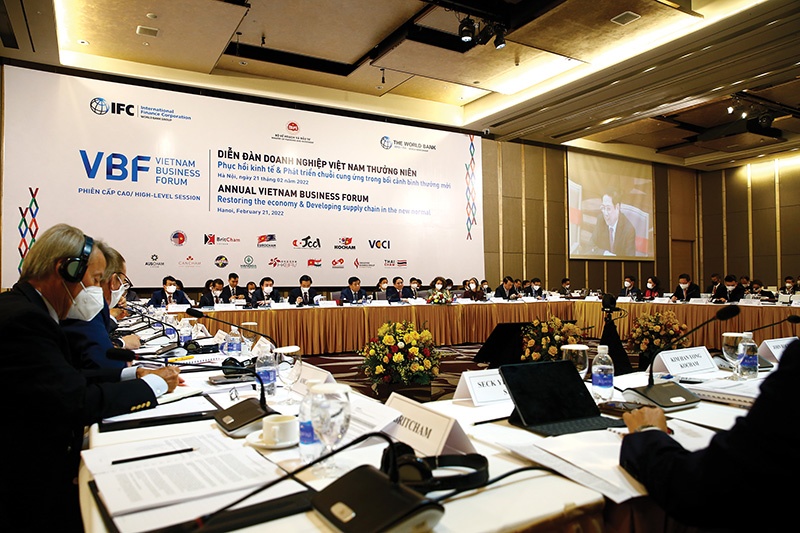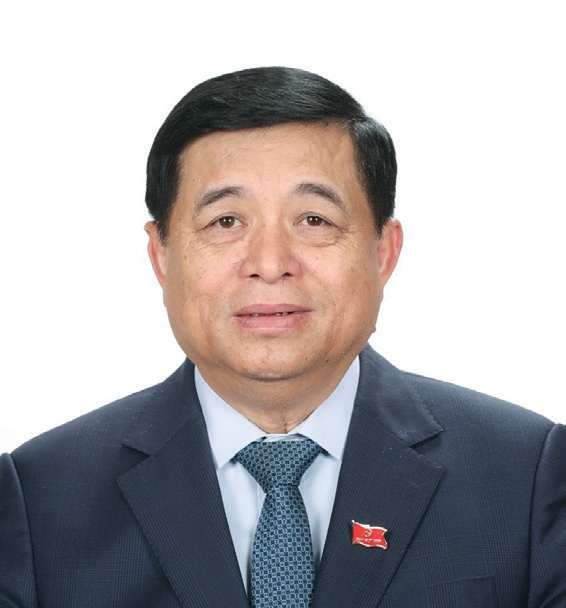All systems go for Vietnam’s essential energy transition
 |
| Ensuring efficient use of Vietnam’s energy supply was a hot topic at last week’s forum |
Last week’s Vietnam Business Forum (VBF) highlighted how Vietnam could fulfil its net-zero carbon emissions by 2050. The government recently released the National Green Growth Strategy for 2021-2030, with a vision to 2050, and the Ministry of Planning and Investment completed the draft National Green Growth Action Plan for the decade, as well as a number of related documents aimed at financially promoting restructure of a green and sustainable economy.
However, implementation faces several obstacles including low awareness, an immature green bond/stock market with restricted product offering, and insufficient financial resources for green initiatives.
The VBF’s Banking Working Group recommended that the government, Ministry of Finance, and State Securities Commission should expeditiously finalise a comprehensive framework to facilitate green capital markets and diversify green financial products. The State Bank of Vietnam, likewise, is encouraged to adopt appropriate green credit agreements and regulations, as well as improve the incentives for banks and credit institutions.
“At the same time, through solutions such as sustainable supply chain finance, banks can reach a diversity of customers in complex supply chains, aiming to achieve the dual goals of providing working capital for businesses to overcome difficulties and risks of supply chain disruption, and at the same time encouraging the development and application of sustainable standards in business operations and long-term growth,” the working group said.
The November 2021 draft of Power Development Planning VIII (PDP8) predicted investment expenses of $131.79 billion for the period 2021-2030, the great bulk of which must come from the private sector. The VBF Power and Energy Working Group and the Environment Working Group embraced the chance to contribute continuous, realistic insights into the policy debate about the growth of the country’s energy sector.
“However, regulations put in place to meet Vietnam’s sustainable energy targets must serve both the long-term interests of the government and satisfy the demands of private sector participants. Governments, multinationals, the private sector, and banks have concluded that the severe environmental repercussions of coal thermal power far exceed the short-term economic benefits. To get the financing required to transition away from coal, Vietnam will need bankable, commercially viable, and low-emission energy projects,” the working group highlighted.
| Nguyen Chi Dung - Minister of Planning and Investment
In order to promote socioeconomic recovery and business development, the government has redirected a number of strategies under the temporary regulation of safe and flexible adaptation to the pandemic. These redirections include easing import and export procedures to prevent the disruption of supply chains, promulgating policies on the extension, exemption, and reduction of a number of taxes, fees, and charges, and ultimately creating favourable conditions for businesses to minimise damage and maintain production. Thanks to these timely policy adjustments, Vietnam’s economy in 2021 achieved positive growth despite challenging situations. With macroeconomic stability ensured and inflation controlled, stable development was seen in most industries. State budget revenue exceeded 16.4 per cent of the estimate. Total import and export turnover increased 22.6 per cent to $668.5 billion, the highest ever. Processing and manufacturing increased by 6.37 per cent, continuing to be the driving force behind growth; trade and services also showed signs of improvement. The stock market developed rapidly, with the capitalisation scale increasing by over 46 per cent compared to 2020. In 2021, nearly 160,000 new businesses were established or returned to operation. Total investment capital increased 3.2 per cent compared to 2020. Foreign direct investment capital reached over $31 billion, up 9.2 per cent compared to 2020, showing that investors continue to believe in the government’s pandemic prevention as well as the investment environment. In terms of innovation, e-commerce, digital transformation, tech applications, and other new business models are increasingly attracting funding. These encouraging economic achievements were obtained thanks to the contributions from the business community as well as both domestic and foreign investors. |
Economic advantages
In fact, a number of financial institutions have promised to stop financing fossil fuel power projects over a net zero-carbon timescale, such as HSBC, Standard Chartered, Citi, and SMFG, among others. Some locally-run lenders, such as HDBank, have also promised to cut ties with coal-fired power plants.
Apart from solar and wind, the American Chamber of Commerce in Hanoi (AmCham) suggested Vietnam use a variety of energy sources including geothermal, hydrogen, and biomass resources, which are only given a very small consideration in the current PDP8 draft.
John Rockhold, chairman of AmCham Hanoi, believes that gas may serve as a key transition fuel, assisting Vietnam in its efforts to move away from coal-fired power.
“Offshore gas-to-power and other similar projects could result in economic and environmental advantages. If tax policy is modified, it is necessary to evaluate tax reforms and subsidies on fossil fuels, and the expansion of certain of Vietnam’s offshore gas reserves should be examined closely,” Rockhold said. “In addition, battery storage will be a critical enabler for a high renewable energy future for Vietnam, which is not only self-sufficient and sustainable but also secure, reliable, and stable.”
A fresh study by the US Agency for International Development revealed that Vietnam’s economic progress has prompted a considerable rise in power consumption and is predicted to continue at 8 per cent until 2030. Thus, Vietnam would require $8-10 billion annually for the energy industry over the next decade to fulfil the burgeoning energy demand and the estimated energy shortfall.
The US Special Presidential Envoy for Climate Change, John Kerry, commented on Vietnam’s pledge to bring net-zero emissions by 2050 and phase out coal power by 2040, saying that the country has made significant commitments and that the Vietnamese government is now striving to achieve these goals. “We are thrilled to work together to accelerate this transition,” Kerry said during a visit to Hanoi last week.
He also emphasised that the comprehensive relationship between the US and Vietnam had become more substantive and beneficial and that there was still great space for collaboration, particularly in the area of climate change response.
“President Joe Biden is eager to assist Vietnam in its efforts to phase out coal via advanced technology and financial assistance,” Kerry noted. “Finding feasible ways to minimise emissions is a daunting task. Our effort to rid the air of pollution is a race against time in a bid to improve our health and boost the economy. “
Stable supply
According to Kim Han Young, chairman of the Korea Chamber of Commerce in Vietnam, the universal growth of renewable energy sources requires not only an expansion of the electricity transmission network but also a solid base power source that can assure steady and continuous output. In this context, an in-depth review of the need for redeploying Vietnam’s nuclear power generating projects, which had previously been suspended for debate, is essential in the medium- and long-term visions.
“South Korea has a lot of experience in nuclear power production and exports abroad, so it can cooperate with the Vietnamese government to aim for a stable power supply in the future,” Young said.
In one example, Korea Gas Corporation (KOGAS) is showing its eagerness to foster green hydrogen production using innovative and renewable energy sources and the liquefied natural gas (LNG) power generation sector in Vietnam.
KOGAS is executing a number of LNG refrigeration projects in South Korea and also wants to investigate and execute an LNG power project in Vietnam.
“Smart cold platforms for agricultural and aquatic product preservation and distribution, data centres, and vaccine storage and distribution are just some examples of businesses that use cold LNG,” the organisation stated.
| Pham Minh Chinh - Prime Minister
Vietnam gained positive achievements in socioeconomic development in 2021, ensuring social welfare for millions of people and maintaining political stability and social security. This was achieved thanks to the people and business communities, as well as the support of international partners. The country has learned valuable experiences from the difficult context of 2021. Firstly, the more difficult and complicated situation, the more we should maintain our bravery, solidarity, perseverance, and wisely choose the right path and solutions. Secondly, it is necessary to build an independent, self-sufficient economy, stabilise the macroeconomy, ensure major balances, not disrupt supply chains, and harmoniously combine monetary and fiscal policies. For issues such as epidemics, natural disasters, climate change, and resource depletion, Vietnam applies a global approach, international solidarity, and upholds multilateralism. In these and other issues, we highlight a whole-people approach, promoting the great solidarity of the whole nation and taking the people as the centre, the goal, and the driving force. For the socioeconomic recovery and development programme, we see that the internal resources of people, natural resources, and cultural traditions are fundamental, strategic, long-term, and decisive; while external resources of institutions, finance, technology, governance, and human resources are important and create breakthroughs. Additionally, Vietnam is strengthening digital transformation, including in infrastructure, governance, and the economy, as well as boosting green transformation. Vietnam calls for ensuring fairness and justice in the process of the green transition. We would like to continue receiving support from the international community in improving institutions as well as diversifying capital sources, green and clean technologies, governance, and human resources. I hope that businesses and associations continue to accompany and support Vietnam in the process of rapid recovery and sustainable development based on the benefits of both sides, and sharing risks together. All ministries and agencies will carefully study, absorb, and respond to the valid opinions and recommendations at the VBF to resolve shortcomings of implementation, remove legal barriers, provide better policies to the business community and international organisations, and promote the development and recovery of the production chains. Tran Thi Lan Anh - Secretary general Vietnam Chamber of Commerce and Industry
In order to restore and develop the supply chain, we propose to promote IT applications in administrative procedures towards fully online public service delivery. Over the last two years, it has been difficult to approach customers and partners to conduct business transactions, especially services related to the issuance and certification of documents. There are still many shortcomings, such as some procedures not accepting online submission or electronic signatures and digital signatures in the registration and approval process, or some procedures still requiring submission of original hard copies, among others. It is necessary to accelerate the delivery of level-4 public services across most administrative procedures and aim towards full online delivery of administrative procedures for businesses and citizens. In order to promote IT application, it is necessary to develop and implement specialised training programmes for technical workers in the current most essential supporting industries. The government needs to have industry-specific skills training programmes that are relevant to the supporting industries as part of key value chains, and part of a specific strategy to attract shifting foreign investment. It is necessary to improve the quality of human resources based on scientific assessments and forecast changes in the labour market and employment in the next 5-10 years. Seck Yee Chung - Vice president VBF Associate Chambers
It is encouraging that the government has policies that help with softening the impact of the economic difficulties caused by the pandemic and safety measures, as well as incentives to attract investment. These policies relate to corporate income tax incentives for businesses, supporting employees and employers affected by the pandemic, reducing land rent by 30 per cent, reducing contributions to the unemployment insurance fund, and more. However, there are cases where foreign investors applied for investment incentives, and competent authorities hesitated to grant them even to the leading companies in the industry because they became overly cautious as to recognising the fulfilment of the conditions to enjoy the applicable incentives. Foreign-invested enterprises that applied for the loan package to pay employment-ceasing wages are required to provide additional documents together with the required documents. Therefore, we recommend that if the laws and regulations provide an incentive for investors, they must clearly describe and elaborate on the conditions to grant such an incentive so that the competent authorities will not hesitate to grant the incentives. The incentives granted and/or lawful status of the investors shall not be deprived retroactively as well as in the future during the period of the operation term of the enterprises, or the period provided by the law on the grounds of changes in laws and regulations or policies after the grant. John Rockhold - Chairman American Chamber of Commerce Vietnam
This VBF comes at an important time for both foreign and domestic companies and provides an opportunity to partner to develop an enabling environment that drives innovation and sustainable growth. The most important factor for a favourable investment climate and maintenance and growth of manufacturing supply chains is a fair, transparent, predictable, and streamlined regulatory environment that values innovation – not only to attract new investment but also to maintain and grow the investment already here. We will continue to advocate for the strengthening of the US-Vietnam trade and investment partnership, including through the Indo-Pacific Economic Framework. In today’s world, you cannot separate the digital economy from the real economy. Digital transformation significantly reduces costs, provides products and services to a broader range of consumers and businesses, and increases access to newer and bigger markets. Vietnam has already experienced strong growth in e-commerce, fintech, edtech, and the creative economy, and recent changes in behaviour have accelerated that growth. To reach its full potential, Vietnam needs to ensure an enabling regulatory environment. We encourage an open and interoperable regulatory environment that enables access to information, data privacy, protection of intellectual property, cybersecurity, and free, fair, reciprocal trade in digital services, and that conforms with global norms. Our member companies are eager to partner with Vietnamese companies to assist their digital transformations and foster a new generation of tech startups to support Vietnam’s goal of the digital economy accounting for a quarter of GDP by 2025. Kim Han Yong - Chairman Korea Chamber of Commerce in Vietnam
To accelerate economic growth and investment revitalisation in Vietnam, it is necessary to provide an environment that meets global standards in which companies can invest and quickly respond to changes in circumstances. Recently, there have been some improvements in regulations in this country, such as the revised Law on Tax Administration and the amendment of the agreement for the avoidance of double taxation between Vietnam and South Korea. In this regard, I respectfully request that the government will provide clear guidelines to ensure that these regulations are consistently applied nationwide, while also providing more seminars to disseminate these changes to South Korean businesses operating in Vietnam. We hope there is an opportunity for Vietnam to recover and become an even more attractive investment destination through an overall review of the tariff system as well as the investment environment of related enterprises, and at the same time review and implement improvement measures. Kenneth Atkinson - Founder, Grant Thornton Vietnam
The heavily-hit tourism industry needs support in the form of waivers in VAT and corporate income tax for tourism companies; reducing electricity prices for hotels; and establishing a fund for companies to apply for interest-free loans to overcome liquidity and cashflow troubles. Domestic airlines should offer subsidised airline tickets for a three-month window to boost domestic travel with a full refund policy. A reclassification in Vietnam of COVID-19 to endemic, treating coronavirus in the same way as we treat flu or other endemic diseases, would be the final solution to living with COVID-19. So a general reopening of the country to tourists as soon as possible, and tourism visas up to three months people who, over winter, months may prefer long stays in warm-weather beach destinations are good solutions for the industry to resume. Additionally, sustainable and green tourism is a key success factor for countries competing for international tourists, so we propose a concept away from low-budget, high-pollution mass tourism to high-spending, low-pollution tourism. We should create more policies and regulations banning plastic, styrofoam, and other environmentally-harmful materials and transition into a sustainable way of life. |
What the stars mean:
★ Poor ★ ★ Promising ★★★ Good ★★★★ Very good ★★★★★ Exceptional
Related Contents
Latest News
More News
- Internal strengths attest to commitment to progress (February 19, 2026 | 20:13)
- Vietnam, New Zealand seek level-up in ties (February 19, 2026 | 18:06)
- Untapped potential in relations with Indonesia (February 19, 2026 | 17:56)
- German strengths match Vietnamese aspirations (February 19, 2026 | 17:40)
- Kim Long Motor and AOJ Suzhou enter strategic partnership (February 16, 2026 | 13:27)
- Haiphong welcomes long-term Euro investment (February 16, 2026 | 11:31)
- VIFC in Ho Chi Minh City officially launches (February 12, 2026 | 09:00)
- Norfund invests $4 million in Vietnam plastics recycling (February 11, 2026 | 11:51)
- Marico buys 75 per cent of Vietnam skincare startup Skinetiq (February 10, 2026 | 14:44)
- SCIC general director meets with Oman Investment Authority (February 10, 2026 | 14:14)








 Tag:
Tag:



















 Mobile Version
Mobile Version